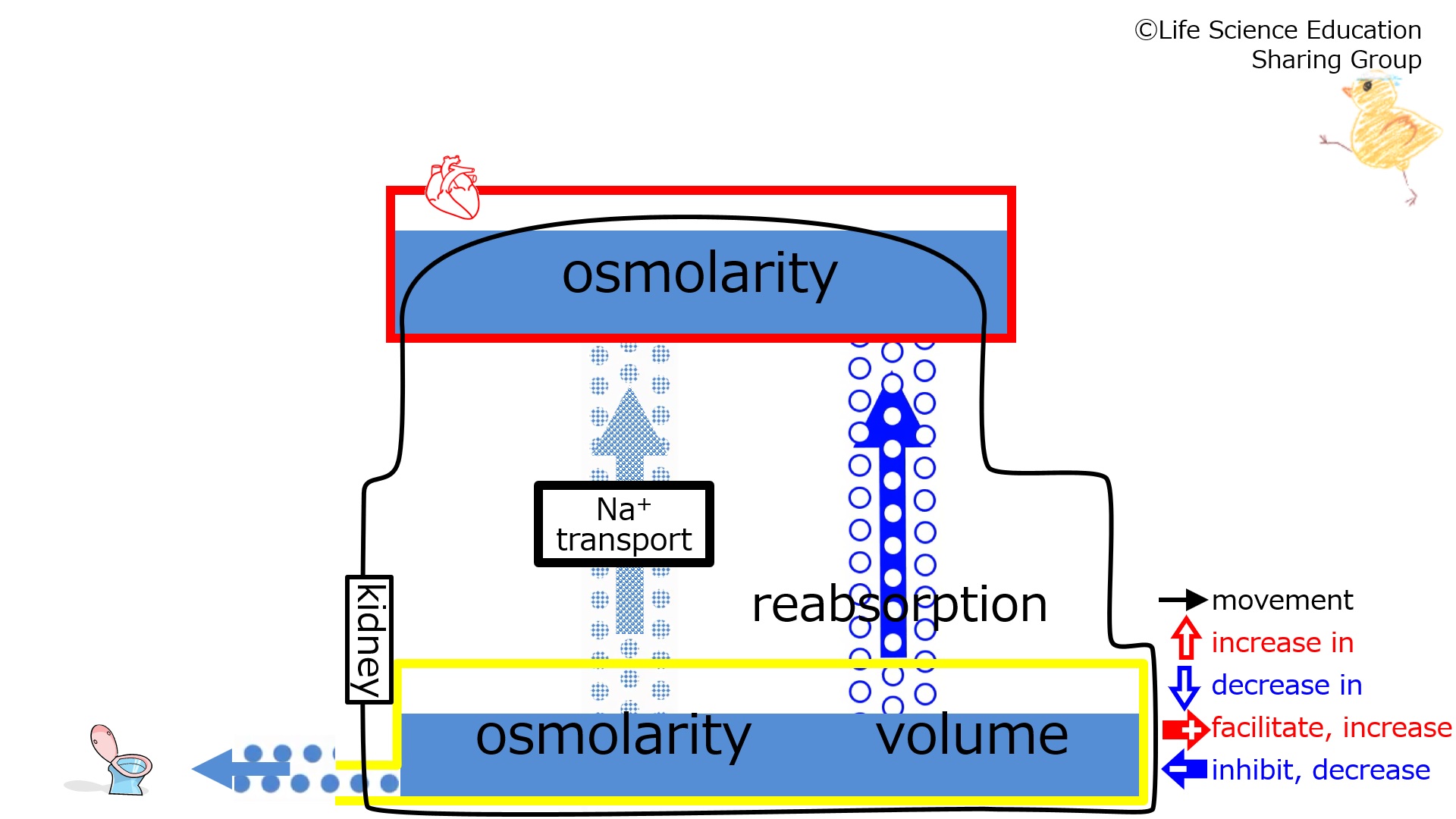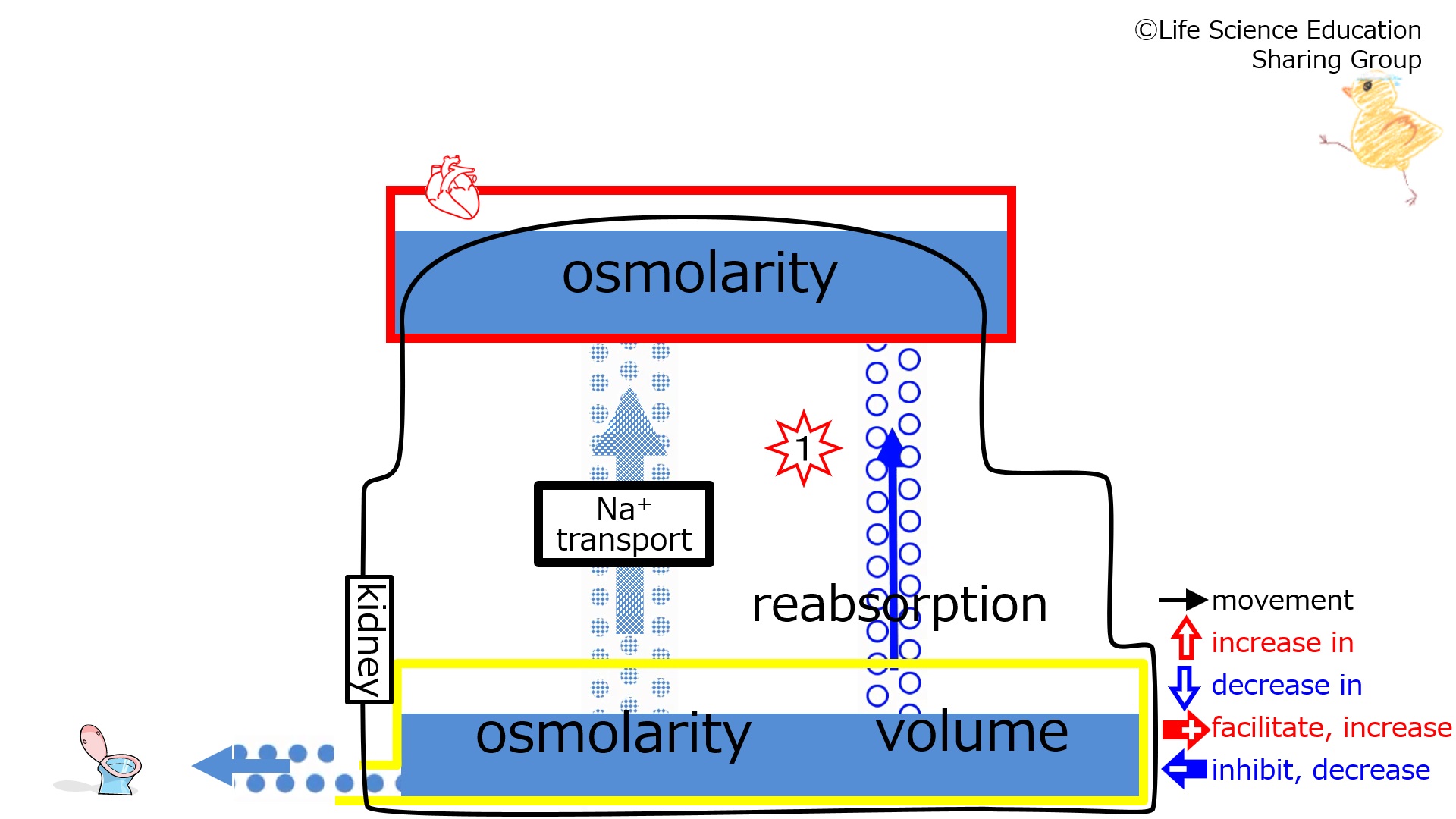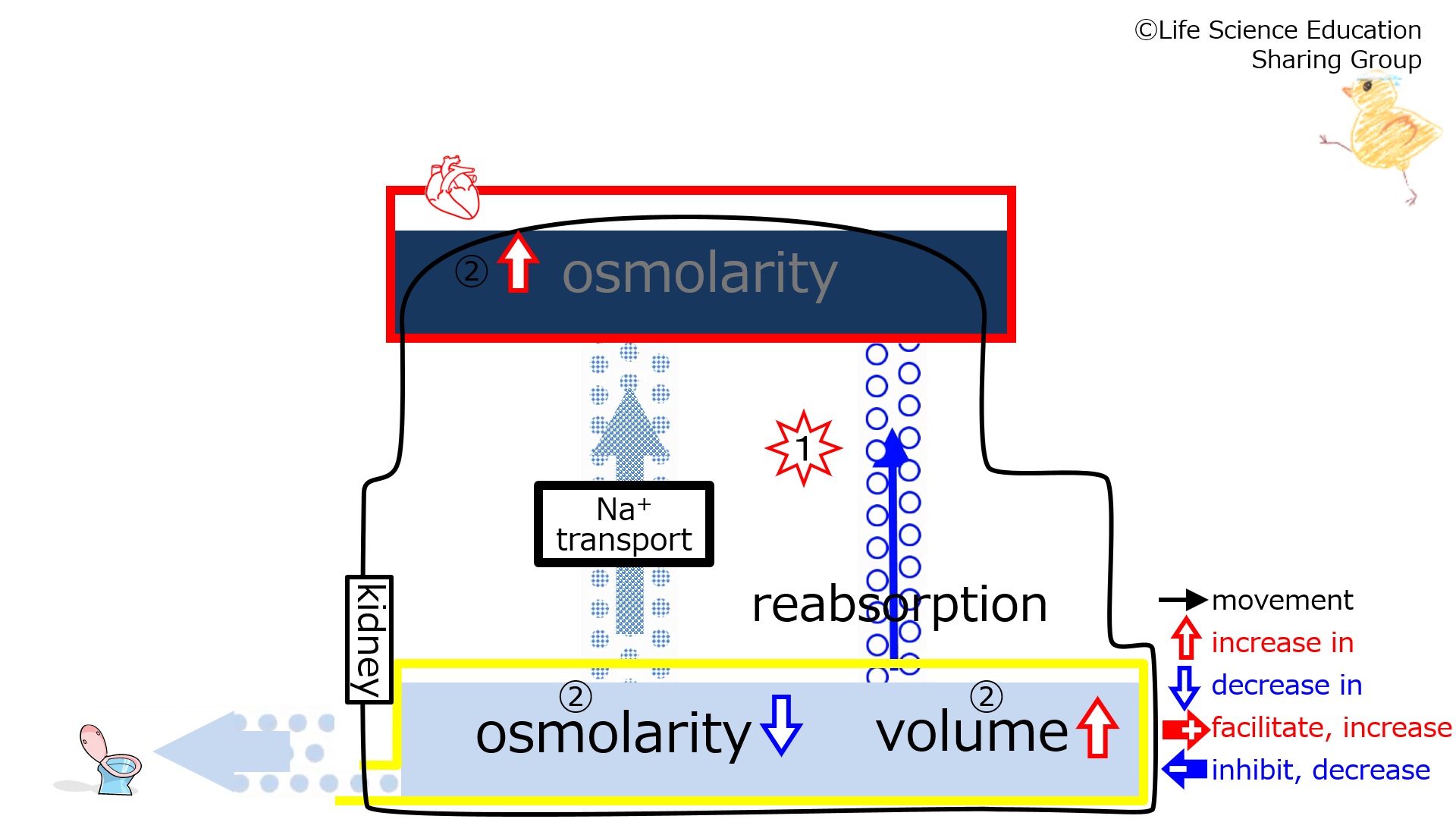「SHolroydAtWeilCornellMedQatar/Urology/Kidney/Tubules/WaterReabsorption/EffectOfDecrease」の版間の差分
編集の要約なし |
編集の要約なし |
||
| 1行目: | 1行目: | ||
{{Point| With a decrease in the water reabsorption from the tubule, plasma osmolarity and urine volume increase, and urine osmolarity decreases. | {{Point| With a decrease in the water reabsorption from the tubule, plasma osmolarity and urine volume increase, and urine osmolarity decreases.}} | ||
[[メディア:6-ADHcontrol-sweat.mp4|narrated video explanation]] | [[メディア:6-ADHcontrol-sweat.mp4|narrated video explanation]] | ||
| 8行目: | 8行目: | ||
[[メディア:WaterReabsorptionBaseLine-Eng.mp4|video prior to the decrease in vasopressin (ADH)]]<br> | [[メディア:WaterReabsorptionBaseLine-Eng.mp4|video prior to the decrease in vasopressin (ADH)]]<br> | ||
--> | --> | ||
Prior to the water reabsorption from the tubule decreasing (at baseline), we will make the assumption that the subject is in homeostasis with normal plasma and urine osmolarities (isotonic) and urine volume. | Prior to the water reabsorption from the tubule decreasing (at baseline), we will make the assumption that the subject is in homeostasis with normal plasma and urine osmolarities (isotonic) and urine volume. | ||
<br style="clear:both;" /> | <br style="clear:both;" /> | ||
</div> | </div> | ||
| 17行目: | 17行目: | ||
[[メディア:WaterReabsorptionEffectOfDecrease-2Eng.mp4|video just after the decrease in vasopressin (ADH)]]<br> | [[メディア:WaterReabsorptionEffectOfDecrease-2Eng.mp4|video just after the decrease in vasopressin (ADH)]]<br> | ||
--> | --> | ||
Step 1: Suppose that the water reabsorption from the tubule decreases. | Step 1: Suppose that the water reabsorption from the tubule decreases. | ||
<br style="clear:both;" /> | <br style="clear:both;" /> | ||
| 25行目: | 25行目: | ||
[[メディア:WaterReabsorptionEffectOfDecrease-3Eng.mp4|video showing the changes in plasma and urine after the decrease in vasopressin (ADH)]]<br> | [[メディア:WaterReabsorptionEffectOfDecrease-3Eng.mp4|video showing the changes in plasma and urine after the decrease in vasopressin (ADH)]]<br> | ||
--> | --> | ||
Step 2: With the decrease in water reabsorption, concentrated (hypertonic) solution enters the plasma. This increases plasma osmolarity (concentrated, hypertonic). Because concentrated (hypertonic) solution leaves the tubule due to reabsorption, the fluid remaining in the tubule has an decreased osmolarity (diluted, hypotonic). Also, with the decrease in water reabsorption, there is more water remaining in the tubule. Overall, the urine becomes diluted and increases in volume. | Step 2: With the decrease in water reabsorption, concentrated (hypertonic) solution enters the plasma. This increases plasma osmolarity (concentrated, hypertonic). Because concentrated (hypertonic) solution leaves the tubule due to reabsorption, the fluid remaining in the tubule has an decreased osmolarity (diluted, hypotonic). Also, with the decrease in water reabsorption, there is more water remaining in the tubule. Overall, the urine becomes diluted and increases in volume. | ||
<br style="clear:both;" /> | <br style="clear:both;" /> | ||
</div> | </div> | ||
| 36行目: | 35行目: | ||
//LEVEL:3 | //LEVEL:3 | ||
//RAND | //RAND | ||
With a decrease in the water reabsorption from the tubule, urine volume {~=increases~decreases} . | With a decrease in the water reabsorption from the tubule, urine volume {~=increases~decreases} . | ||
//LEVEL:2 | //LEVEL:2 | ||
//RAND | //RAND | ||
With a decrease in the water reabsorption from the tubule, urine osmolarity {~increases~=decreases} . | With a decrease in the water reabsorption from the tubule, urine osmolarity {~increases~=decreases} . | ||
//LEVEL:2 | //LEVEL:2 | ||
//RAND | //RAND | ||
With a decrease in the water reabsorption from the tubule, plasma osmolarity {~=increases~decreases} . | With a decrease in the water reabsorption from the tubule, plasma osmolarity {~=increases~decreases} . | ||
</GIFT> | </GIFT> | ||
2020年3月31日 (火) 10:14時点における版
| With a decrease in the water reabsorption from the tubule, plasma osmolarity and urine volume increase, and urine osmolarity decreases. |
Prior to the water reabsorption from the tubule decreasing (at baseline), we will make the assumption that the subject is in homeostasis with normal plasma and urine osmolarities (isotonic) and urine volume.
Step 1: Suppose that the water reabsorption from the tubule decreases.
Step 2: With the decrease in water reabsorption, concentrated (hypertonic) solution enters the plasma. This increases plasma osmolarity (concentrated, hypertonic). Because concentrated (hypertonic) solution leaves the tubule due to reabsorption, the fluid remaining in the tubule has an decreased osmolarity (diluted, hypotonic). Also, with the decrease in water reabsorption, there is more water remaining in the tubule. Overall, the urine becomes diluted and increases in volume.
Challenge Quiz
With a decrease in the water reabsorption from the tubule, urine volume increases decreases .
With a decrease in the water reabsorption from the tubule, urine osmolarity increases decreases .
With a decrease in the water reabsorption from the tubule, plasma osmolarity increases decreases .



